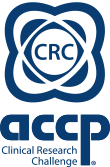 Interviewees: Pollyanna Leung, Ryan Sue, April Zhou
Interviewees: Pollyanna Leung, Ryan Sue, April Zhou
Interviewers: Kaely Miller (SNAC Chair) and Geetha Lingechetty (SNAC Secretary)
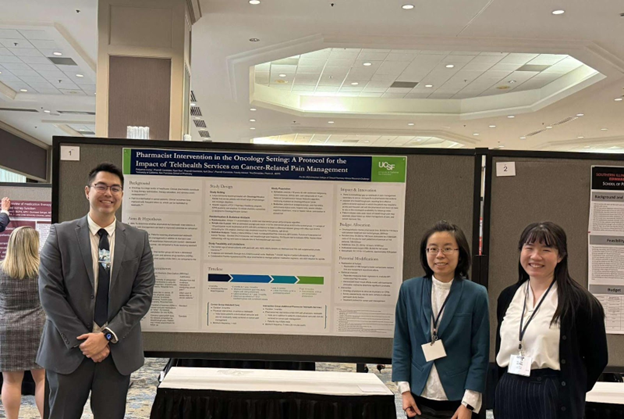 Meet the Winners of the 2023 Clinical Research Challenge!
Meet the Winners of the 2023 Clinical Research Challenge!
(Left to Right: Ryan Sue, Pollyanna Leung, and April Zhou)
This year, Ryan Sue, Pollyanna Leung, and April Zhou from the University of San Francisco School of Pharmacy earned the title of ACCP's 2023 Clinical
Research Challenge (CRC) champions at the Annual Meeting in Dallas, TX. Under the guidance of Dr. Tina Denetclaw, Pharm.D., their proposal was titled,
"Pharmacist Intervention in the Oncology Setting: The Impact of Telehealth Services on Cancer-Related Pain Management." After their victory earlier
in the year, ACCP National Student Network Advisory Committee Chair (Kaely Miller) and Secretary (Geetha Lingechetty) asked the team a few questions:
Why did you choose pharmacy?
Ryan: I chose pharmacy because I have always been really interested in complex molecules’ therapeutic effects and hope to advance medicine through a patient-centric approach to drug development. My bachelor’s is in pharmaceutical chemistry and I hope to pursue a career in clinical research, so pharmacy felt like the perfect fit where I’d be able to expand my knowledge of a multitude of disease states and their respective treatment landscapes.
April: After being involved with research looking at antibiotic resistance, I became interested in infectious diseases. Pharmacy felt like the right intersection where I could both pursue this interest further and be involved more directly with patient care.
Pollyanna: After seeing patients on high-risk drugs like insulin and anticoagulants, I became interested in the idea of becoming a medication expert on a patient care team. As a pharmacist, I would be able to help both patients and other fellow healthcare professionals.
|
How did you choose to work together on this team?
We tried to stay as organized as possible and constantly communicate so we could set aside time to work individually, and then review the elements of our proposal together for a cohesive deliverable. As we advanced, we coordinated our schedules and set soft deadlines to ensure adequate time to complete our tasks efficiently.
|
What did you do to prepare?
With the help of our mentor, Dr. Tina Denetclaw, we organized a couple of practice sessions to strengthen our teamwork and speed for the journal club round. We utilized practice questions from the ACCP website and reviewed biostatistics lessons as well. For the LOI round, we brainstormed a ton of topics we felt could apply to the prompt and discussed what we thought would give us an edge in innovation with our study, searching for unmet needs in the oncology space where pharmacists could utilize their medication specialization. We compiled as many relevant resources as we could for our topic and reviewed the literature together to develop our overall plan.
|
What tips or tricks do you have for future competitors?
The approach that worked for us was to try and find relevant and emerging topics in healthcare to apply to the therapeutic area given and assess unique areas of improvement within the treatment space. Telehealth has gained a surge of popularity since the COVID-19 pandemic and has helped alleviate a lot of patient burden, so we wanted to tie this into our proposal and focus on an aspect of care within the oncology setting where a pharmacist could fully utilize their strengths.
|
What did each of you bring to the team that was unique?
Ryan: In my managed care internships, I reviewed primary literature to compose formulary recommendations for Pharmacy & Therapeutics Committees. This helped me to better evaluate biases and the validity of clinical research and hypothesize how to eliminate any bias in our trial design.
April: Through my undergraduate and into the pharmacy program, I've been involved with research and data analysis. This equipped me well in understanding study design and interpreting analytical results and chosen methods.
Pollyanna: I tried to put myself in a patient’s shoes when brainstorming what topics, we should address for our research proposal that also met the requirements of the prompt.
|
In hindsight, is there anything you would have done differently to prepare?
In hindsight, we could have practiced our efficiency a bit more before the journal club round. The time flies by and there are lots of questions to get through, so while we were very proud of ourselves for advancing, we could have practiced our speed to ensure we could finish with a strong pace in round 1. We could also have been more detail oriented as we built our proposal.
|
What motivated you to compete in the CRC? What motivations did you have throughout your preparation?
We were motivated to compete in the CRC to strengthen our knowledge of clinical research and trial design. Overall, we participated to gain meaningful experience we could apply to our post-graduate plans and explore opportunities in clinical research.
|
Who was your most influential mentor?
Our most influential mentor was Dr. Tina Denetclaw, who helped organize the local competition, practice for the journal club round, and submit our deliverables throughout the challenge. A huge thanks to Dr. Denetclaw for all of her help and hard work!
|
Congratulations to the Winners of the 2023 Clinical Research Challenge!

 Meet the Winners of the 2022 Clinical Research Challenge!
Meet the Winners of the 2022 Clinical Research Challenge!
(Left to Right: Jason Srey, Trisha Villanueva, and Bryan Le)
Written by: Kristine Yee, PharmD Candidate 2022, University of Colorado Skaggs School of Pharmacy
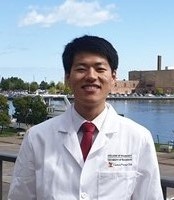
Minjong Kim
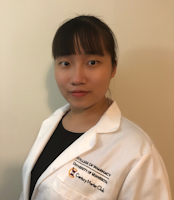
Loan Tran
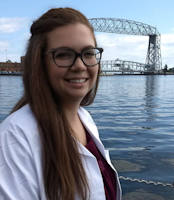
Rachel Moniz
This year, Minjong Kim, Loan Tran and Rachel Moniz of the University of Minnesota, College of Pharmacy earned the title of ACCP’s 2021 Clinical Research Challenge (CRC) champions. Under the guidance of Dr. Ann Philbrick, PharmD, their proposal was titled “Pharmacist Intervention in Oral Chemotherapy: Minimizing Toxicity with Telemonitoring and Patient-reported Outcomes.” Rachel’s professional interests is to pursue a residency and become a clinical pharmacist specializing in oncology. She would like to continue to incorporate research focusing on oral chemotherapy toxicity. Loan would like to pursue either a residency or fellowship that would help her further develop patient care and research skills. She would ultimately like to become an academic pharmacist and continue doing clinical research. After their victory, ACCP National Student Network Advisory Committee reached out to some of the competitors to ask a few questions:
How did you choose to work together on this team?
Our ACCP chapter hosts the local competition, and the three top scorers were selected to compete in the national rounds. Little did we know that it turned out to be the dream team!
|
What did you do to prepare?
We reviewed past journal club articles and utilized literature searches to study the design of similarly structured trials. This was essential to our preparation for each round. Additionally, reaching out to other professors, advisors and mentors were great resources to provide invaluable insight and guidance to make sure our proposal could be implemented in clinical practice.
|
What tips or tricks do you have for future competitors?
We would recommend being familiar with the competition schedule ahead of time and having a clear plan for the team at the beginning to help balance schoolwork and the competition demands. Also, to not feel too stressed about last-minute things that might arise from the competition. Things were constantly changing but we were able to take pieces of research that has already been done and put it together in an innovative way.
|
In hindsight, is there anything you would have done differently to prepare?
We would have communicated earlier in the rounds to decide on our research topic sooner, ideally two or three days after the release of the research question. Having a plan would have avoided some of the last-minute work that needed to be done before the deadline.
|
What motivated you to compete in the CRC? What motivations did you have throughout your preparation?
We heard about the meaningful impact the CRC has on pharmacy students and decided to it was a great opportunity to expand our current knowledge. Our interest in clinical research and applying clinical knowledge to help improve healthcare motivated us to continue the process to see how our topic could potentially help cancer patients in the future.
|
Who was your most influential mentor?
Rachel: This competition has shown me that so many pharmacists are willing to help you grow within the field. However, my most influential mentor was Dr. David Stenehjem. His expertise on our topic and willingness to support us throughout the process was instrumental in our success and learning.
Loan: My most influential mentor was my research advisor. He has taught me about the importance of lifelong learning, and the value of hard work. I admire his great knowledge and expertise in pharmacogenomics and oncology.
|
We would like to thank every who has competed in the CRC and congratulate the University of Minnesota College of Pharmacy for their first-place victory. We wish Minjong, Loan and Rachel the best of luck on their future endeavors, and we hope their tips and tricks can help competitors in future competitions.
Written by: Nicole Hume, PharmD Candidate 2021, University of Pittsburgh School of Pharmacy
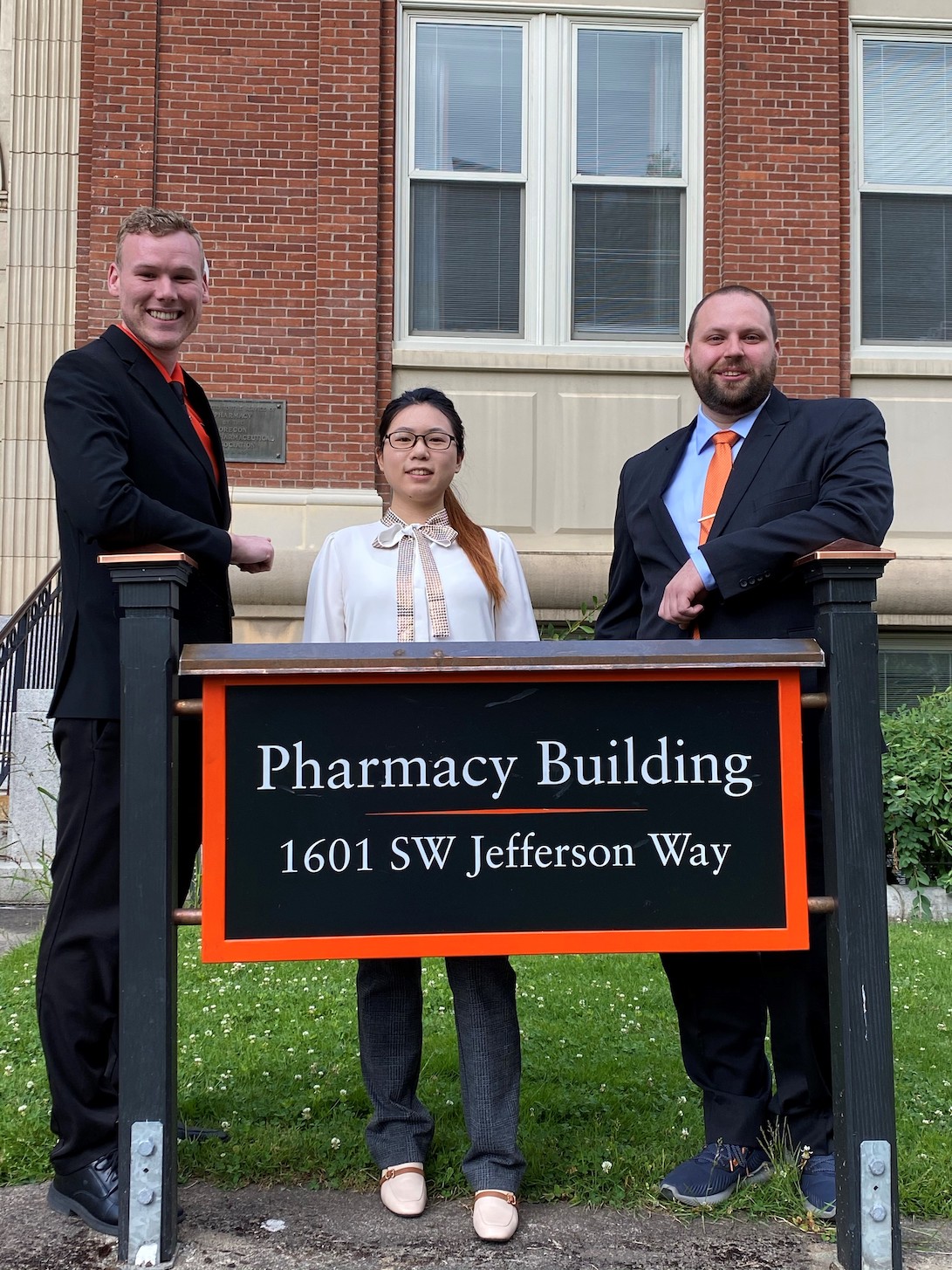 Meet the Winners of the 2020 Clinical Research Challenge!
Meet the Winners of the 2020 Clinical Research Challenge!
(Left to Right:Justin Donat, Xueer Li, and Brandon Gill)
This year’s Clinical Research Challenge (CRC) winner is Oregon State University College of Pharmacy, making this the second consecutive year Oregon State University has taken the winning title for the CRC. Team members included Justin Donat, Xueer Li, and Brandon Gill. Their faculty liaison, Adriane Irwin, PharmD, has advised the past two CRC teams to victory. Their proposal was titled ‘Preventing the Transition from Gestational to Type 2 Diabetes Mellitus: A Clinical Pharmacy Approach.’ Justin’s professional interests include clinical pharmacy services, rural health, and emergency medicine. He plans to pursue a PGY1 hospital residency with an emphasis in acute care in 2022, with the goal of becoming pharmacy manager at a community medical center. Xueer is interested in building a career in pharmacy industry. One of her career goals involves working in clinical trials, which would allow her to provide patient care and get involved in new drug development at the same time. Brandon plans to pursue a PGY1 residency in the acute care setting and will continue exploring specialties that he is passionate about and can thrive in. After their victory, the ACCP National Student Network Advisory Committee reached out to the competitors to ask a few questions:
How did you choose to work together on this team?
Our ACCP chapter hosts an internal CRC competition, similar to the literature evaluation round. Our advisor, Dr. Irwin, then selects 3 students based on our score and preparation session participation. The preparation sessions build a sense of camaraderie, prior to the official team formation, so we were already accustomed to working together. The three of us are in the same class and we had worked on previous projects, so we made a great team.
|
What did you do to prepare?
Dr. Irwin holds preparation sessions during the fall to review various topics in literature evaluation. These sessions were instrumental in the literature review competition and building a foundation for the written proposals. Additionally, our team looked to previous years’ proposals for guidance on the elements of a successful proposal.
|
What tips or tricks do you have for future competitors?
One piece of advice we took to heart was “don’t reinvent the wheel.” Our team researched what worked well in previous years and what areas we could improve upon to make our proposal even stronger. Additionally, we recommend starting to prepare early. The faster you can get a working draft together, the more time there will be for feedback, edits, and fine tuning.
|
In hindsight, is there anything you would have done differently to prepare?
We would have prepared our project schedules ahead of time, to balance our other demands. We prioritized exams and schoolwork for the first few weeks of preparation, causing us to fall behind schedule and creating unnecessary stress. We also would have spent the time between competition rounds researching the format, identifying and leveraging individual strengths, and creating a plan of attack to start each round promptly and efficiently.
|
What motivated you to compete in the CRC? What motivations did you have throughout your preparation?
Fame and fortune, of course! We all have interest in clinical research and competed in our internal competition last year as well. We were inspired and motivated by our classmates’ achievement in last year’s competition and wanted to continue the legacy of OSU’s success in this competition.
|
Who was your most influential mentor?
Gill: My MOST influential mentor is strangely enough my high school German teacher, Herr Jones. Though it has been over a decade, I still remember our many philosophical conversations and his unique take on life. I like to think of him as my life teacher who also taught German occasionally.
Donat: My most influential mentor was Gene Vang, the Pharmacy Manager at Walmart Neighborhood Market in Corvallis. He was recently honored as the OSPA Resourceful Pharmacist of the Year. I’ve worked with Gene since 2018 and he has helped me see what’s important in patient care, leadership, and personal development. HIs consistent feedback and encouragement have always motivated me to pursue clinical pharmacy.
Li: Although I do not have a formal mentor at this time, my IPPE rotation at Oregon Health & Science University has introduced me to many role model pharmacists. Seeing how outstanding and respectable they are, it encourages me to become a better pharmacist.
|
We would like to thank everyone who has competed in the CRC and congratulate Oregon State University College of Pharmacy for their second consecutive victory. We wish Justin, Xueer, and Brandon the best of luck on their future endeavors, and we hope their tips and tricks can help competitors in future competitions!
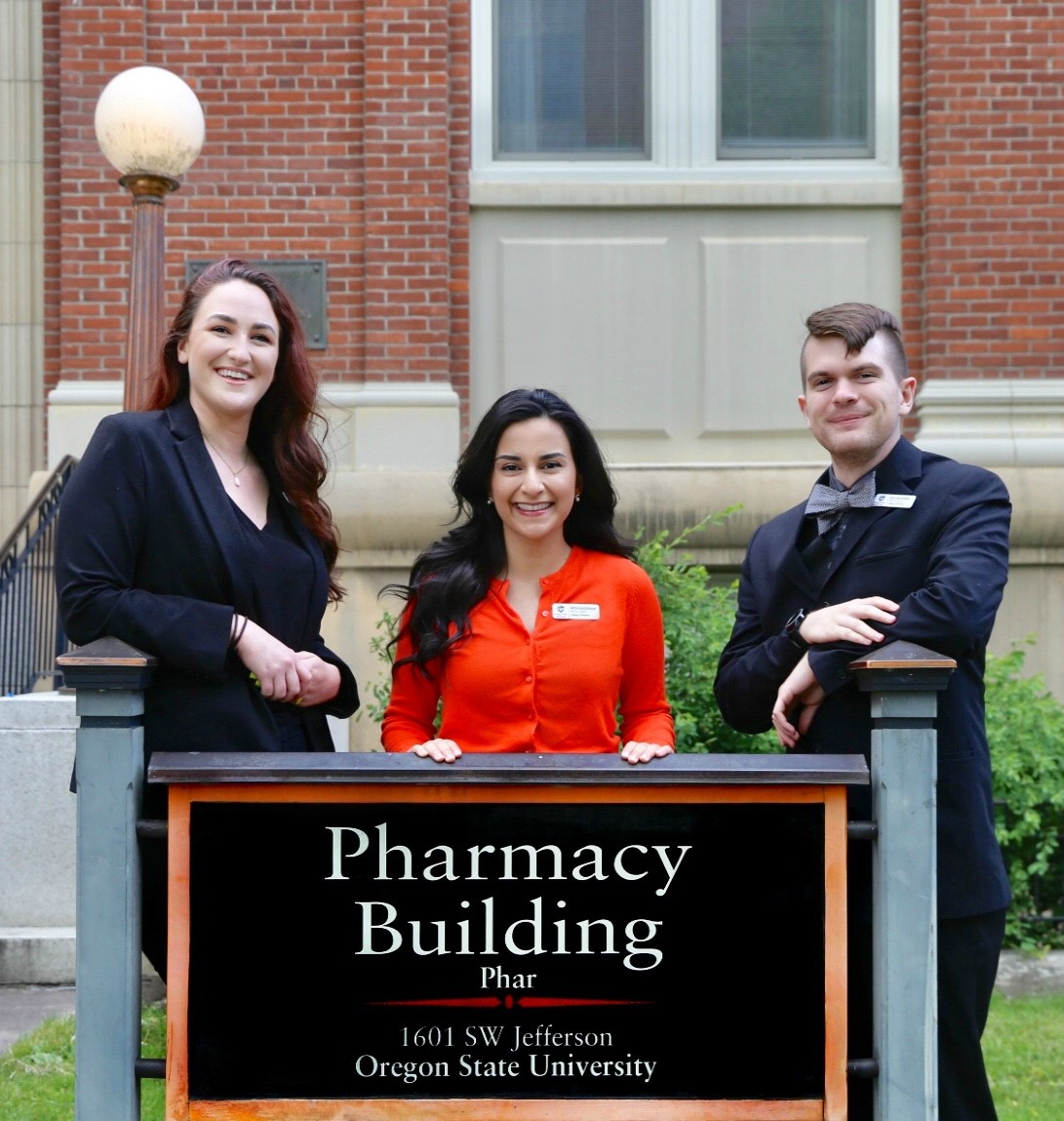 Meet the Winners of the 2019 Clinical Research Challenge!
Meet the Winners of the 2019 Clinical Research Challenge!
(Left to Right: Kaitlyn Wells, Neda Kazerouni, and Dale Wilkerson)
This year’s Clinical Research Challenge (CRC) is Oregon State University College of Pharmacy. Team members include Neda Kazerouni, Kaitlyn Wells,
and Dale Wilkerso with faculty liaison Adriane Irwin, PharmD. Their proposal was titled HEDIS Measures and Osteoporosis: A Clinical Pharmacy Approach
to Optimize Fracture Care in Postmenopausal Females. Each member has different career goals, but state that the CRC has positively influenced them to
being more involved in clinical pharmacy and research. Neda Kazerouni will be graduating in 2021 and plans to pursue a PGY1 residency to develop her
clinical skills upon graduation. She states that because of her involvement in CRC, she plans to advance her working knowledge of academic and clinical
research to expand the scope of practice for pharmacists nationwide. Kailtyn Wells will be graduating in 2022 with plans to complete post-graduate
training in pharmacogenomics. This training will allow her to advance and utilize her interests in biochemistry and molecular biology to improve
patient outcomes. She states that the CRC has motivated her to expand her engagement in clinical pharmacy research as she progresses through the
pharmacy program at Oregon State University/Oregon Health & Science University. Dale Wilkerson is currently completing basic military training.
He will be graduating in 2022 with plans to pursue a career as a pharmacist with the Army Reserve following graduation.
To inspire and guide future competitors in the CRC, we asked this team a few questions to enlighten us how the team was so successful. Responses are below.
What did you do to prepare?
In preparation for the clinical research challenge, our ACCP chapter advisor, Dr. Adriane Irwin, hosted weekly prep sessions designed to test and enhance our
knowledge of biomedical statistics and drug literature evaluation. These sessions allowed our team to advance through Round 1 of the competition and provided
us with a strong working knowledge of the components required for a research proposal.
|
What tips and tricks do you have for future competitors? In hindsight, what would you do different to prepare?
We strongly advise future competitors to be flexible and adaptive when developing their research proposals. There were several instances in which we had to
abandon our progress and start from scratch. Students should not be afraid to entertain new ideas and continuously revise their work even when the task
seems daunting. In addition, we advise future competitors to start early and utilize the knowledge of professional contacts and resources to develop a
successful proposal.
|
What motivated you to compete in CRC? What motivations did you have throughout your preparation?
Since the inception of the CRC, our student-led teams have ranked in the top 3 each year. This legacy has served as a large motivating force behind our
efforts to preserve the standard of excellence our peers have demonstrated.
|
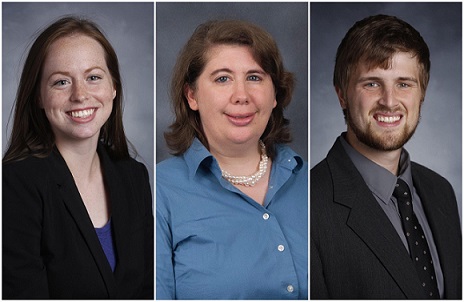 Meet the Winners of the 2018 Clinical Research Challenge!
Meet the Winners of the 2018 Clinical Research Challenge!
(Left to Right: Victoria Smith, Karla Marz, and Parker Johnson)
Proposal Title: Antibiotic Stewardship in a Small Hospital: Overcoming Barriers with Telemedicine.
What did you do to prepare?
We individually reviewed the assigned paper before the first round, and then we met with a faculty research advisor before the Letter of Intent and Research Proposal rounds
so that she could introduce us to the format. We spent a significant amount of time planning and outlining what we wanted out of our project before we began writing, which
allowed us to troubleshoot many problems before putting in the effort to write them out.
|
What tips and tricks do you have for future competitors? In hindsight, what would you do differently to prepare?
Don't be afraid to revise or go in a new direction when you come across new information or ideas. Our original idea looked nothing like our final project based on the
research we did in the course of writing and development. Spend time thinking about how to make your question innovative rather than simply accomplishing the requirements
of the competition. Also take the time to discuss reviewers' comments on the Letter of Intent and decide what should be clarified or changed.
|
What motivated you to compete in CRC/CPC? What motivations did you have throughout your preparation?
We originally competed because it sounded like an interesting challenge, but as we went further in the competition we were driven by investment and engagement in the
topic. Antibiotic stewardship is a vital area of pharmacy practice, so coming up with solutions let us become engaged in the profession while still in school.
|
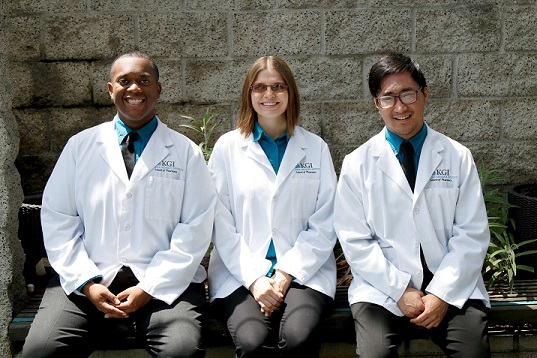 Meet the Winners of the 2017 Clinical Research Challenge!
Meet the Winners of the 2017 Clinical Research Challenge!
(Left to Right: Russle Benson, Adrienne Desens, and Keith Suehiro)
Proposal Title: Innovative Hospital Discharge Antibiotic Stewardship Program for Patients with Moderate to Severe Community-Acquired Pneumonia.
What did you do to prepare?
- For the initial rounds of the Clinical Research Challenges, we practiced reading and analyzing articles. I made sure to familiarize myself with many different types of studies and reached out to faculty with any concepts we had difficulty with.
- We made sure to brush up on my statistics, just because there are several questions in the first round pertaining to data analysis.
- We met as a team often to discuss our strengths and weaknesses, and where we could best support one another.
|
What tips and tricks do you have for future competitors? In hindsight, what would you do differently to prepare?
- The project takes a tremendous amount of time; make sure to work on it early and often.
- Set hard deadlines to have each part completed at least one day before so you can be sure to be ready to turn it in the next day.
- Try to find a relevant topic where there are few or no published studies (ie. Identify a need).
- Ask practicing pharmacists about clinical relevance of study topics and designs.
- Many initial study ideas we had were not very practical and would have been hard to set up logistically.
|
What motivated you to compete in CRC/CPC? What motivations did you have throughout your preparation?
- I wanted to learn more about the process of designing clinical research, from conducting background research to determining the study plan.
- After passing the first round, I was more motivated to write the LOI. And, after our LOI was selected, I was determined to give it my all when writing our research proposal.
- I was motivated by the study topic, as it was something quite important where very little had been published. What we were researching was both innovative and clinically relevant.
|
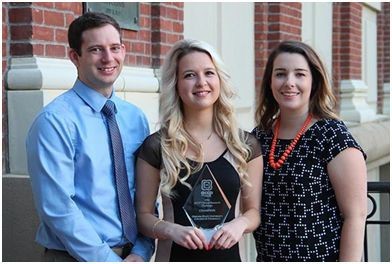 Meet the Winners of the 2016 Clinical Research Challenge!
Meet the Winners of the 2016 Clinical Research Challenge!
(Left to Right: Peter Atkins, Julia Zhukov, and Katie LaRue)
Proposal Title: Pharmacists Supporting Healthy Hearts.
What did you do to prepare?
“Before the first round, we had weekly meetings with our faculty advisor, Dr. Irwin, to go over what we had learned in our drug information classes and to discuss research concepts that would help improve our knowledge base. We also read and analyzed research articles independently before discussing them as a group and working through any concepts we didn’t fully understand.”
|
What tips and tricks do you have for future competitors? In hindsight, what would you do differently to prepare?
“We started by each member bringing ideas to the table and discussed what each might look like, such as what to include in the budget, how long the timeline would realistically need to be, inclusion/exclusion criteria for participants, and if we thought we would have enough statistical power to analyze outcomes. In the final round, we struggled with determining which outcomes of interest we wanted to focus on and what would be realistic in our given budget and timeline. As we started editing our proposal, we found it difficult to find the appropriate balance between the depth of information portrayed and our assumptions of the reader’s knowledge. This also made us think about what information was most important to include given page length restrictions.”
|
What motivated you to compete in CRC/CPC? What motivations did you have throughout your preparation?
“To our knowledge, this is the first time in recent history that Oregon State University College of Pharmacy students have won a national knowledge-based competition. This win generated a lot of excitement in our college and sparked interest in expanding our ACCP chapter.”
|